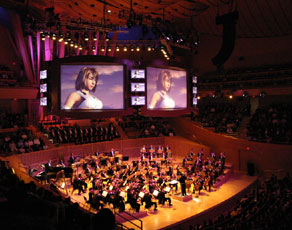


The musical scores of video games today are not to be belittled. Nothing like the blips of sounds that once accented the first games, many of the games have a full length soundtrack that can rival those of movies. Ranging from entirely synthesized music to a score played by world famous orchestras, video game music is making giant leaps into the music player of many gamers and non-gamers alike.
The most successful example is video game music composer Nobuo Uematsu, who has composed a majority of the music for many of the Final Fantasy games. Final Fantasy music concerts have been fairly popular in Japan and within the past two years, this popularity spread into the U.S., on May 10, 2004. The very first concert, entitled Dear Friends, featured fan favorites from several of the Final Fantasy soundtracks and was held at the Walt Disney Concert Hall. The concert tickets sold out in three days and its enormous success was a precedent for Play!, a new concert tour for video game music.

The Play! concert tour included tracks from many popular videos games, including Final Fantasy, The Legend of Zelda, The Super Mario Brothers, Metroid and The World of Warcraft. Play! toured several major U.S. cities with Grammy-winning conductor Arnie Roth. Play! premiered in Chicago May 27, 2006 with a majority of the composers attending as specials guests. Japanese artist Angela Aki was also at the premiere to perform the theme song for the new Final Fantasy XII live. Concert attendees not only enjoyed the music but also video clips from the respective games played on enormous screens. The Chicago premiere was performed by the Chicagoland Pops orchestra. A special promotion for the free download of the new Oblivion game's full soundtrack was offered to all concert-goers. The audience demographic was a wild mixture of people. There were quite a few females, contrary to the belief that "girls don't play games". The age range included middle schoolers to people in their 40s. There were parents there with their kids. There were girlfriends accompanying boyfriends, or vice versa. Some wore their t-shirt and sandals to the concert while others rented tuxedos. The more fervent fans donned a costume of their favorite video game character. This is hardly the traditional picture of video game "dorks".